Curriculum of the Certificate Course in
Financial Accounting using Tally ERP.9” w.e.f. 2017-18
Course Code: Tally.ERP.9
Course Objectives:
- To learn Basics of Accountancy, its principles, concepts, conventions, recording procedures, Bank reconciliation, final accounts etc.
- To learn and practice Computerized Accounting Systems using Tally.ERP.9
Course Contents: Total 70 hours
CHAPTER 1:- FUNDAMENTALS OF ACCOUNTING (10 Lectures)
1.1. Introduction and Meaning of Business
1.2 Types of Business Organizations
1.3 Meaning and Types of Transactions
1.4 Meaning and Types of Vouchers
1.5 Parties/ Stakeholders Related to Business
1.6 Basic Accounting Concepts
1.7 Meaning of Book-keeping and Accountancy
1.8. Branches of Accounting
1.9 Systems of Accounting
1.10 Meaning and Types of Account
1.11 Golden Rules of Accountancy
1.12 Stages of Financial Accounting
1.12.1 Journal
1.12.2 Ledger
1.12.3 Trial Balance
1.12.4 Final Accounts
CHAPTER 2:- MAINTAINING CHART OF ACCOUNTS (15 Lectures)
2.1 Introduction and Opening Screen of Tally
2.2 Company Creation
2.3 Company Features and Configuration
2.4 Meaning and Nature of Group
2.5 Predefined Groups in Tally
2.6 Ledger Creation
2.7 Groups Creation
2.8 Practical Assignments
CHAPTER 3:- MAINTAINING INVENTORY (6 Lectures )
3.1 Introduction to Inventory (Skill Academy Books Business)
3.2 Inventory Masters in Tally
3.3 Creation of Stock Group
3.4 Creation of Units of Measure
3.5 Creation of Stock Item
3.6 Creation of Godown
3.7 Creation of Stock Category
3.8 Practical Assignments
CHAPTER 4:- RECORDING DAY TO DAY TRANSACTIONS (10 Lectures )
4.1 Introduction
4.2 Source Documents or Vouchers Requied for Accounting
4.3 Accounting Vouchers
4.4 Inventory Vouchers
4.5 Practical Assignments
CHAPTER 5:- ADVANCED FEATURES IN TALLY ERP 9 (8 Lectures)
5.1 Maintaining Billwise Details in Tally Erp 9
5.1.1 New Reference
5.1.2 Against Reference
5.1.3 Advance
5.1.4 On Account
5.2 Cost Centers
5.2.1 Cost Categoy
5.2.2 Cost Center
5.2.3 Creation of Cost Category
5.2.4 Creation of Cost Center
5.3 Practical Assignments
CHAPTER 6:- MIS REPORTS (6 Lectures)
6.1 Introduction
6.2 Advantages of Management Information Systems
6.3 MIS Reports in Tally.ERP 9
6.3.1 Trial Balance
6.3.2 Profit and Loss Account
6.3.3 Balance Sheet
6.3.4 Daybook
6.3.5 Purchase Register
6.3.6 Sales Register
6.3.7 Bills Receiveable and Bills Payable
6.4 Practical Assignments
CHAPTER 7:- INTRODUCTION TO GST WITH ASSIGNMENTS( 15 Lectures)
7.1 Introduction to Goods and Services Tax
7.2 Enabling GST and Defining Tax Details
7.3 Intrastate Supply of Goods
7.3.1 Intrastate Inward Supply
7.3.2 Intrastate Outward Supply
7.4 Inter State Supply
7.4.1 Inter State Inward Supply
7.4.2 Inter State Outward Supply
7.5 GST Reports
7.5.1 Generating GSTR-1 in Tally.ERP 9
7.5.2 Generating GSTR-2 in Tally.ERP 9
7.6 Input Tax Credit Set Off
7.7 GST Tax Payment
7.8 Practical Assignments

Curriculum of the Programme w.e.f. 2017-18
Collaborative Institute: National Institute of Securities Markets
NISM is the academic wing of SEBI. Dayanand College of Commerce was approved as the testing centre for NISM certification courses since 2017-18. The first batch of the NISM-Courses was started in 2017-18 (November 2017 to January 2018). Mr.Shrikant Pandya was appointed as the Course Coordinator.
The details of the Programme are as under:
| Sr.No. | Name of the Programme | Programme Code | Marks | Study hours | Web-link | Web-link |
| 1. | NISM-Series-V-A: Mutual Fund Distributors Certification Examination | NISM-Series-V-A | 100 | 60 | Syllabus | E-book of Mutual Fund |
| 2. | NISM-Series-XII: Securities Markets Foundation Certification Examination | NISM-Series-XII | 100 | 60 | Syllabus | E-book of Securities Markets |
The curriculum, study material can be downloaded from the given web-links.
Statement of NISM Course batches completed w.e.f.2017-18
| Sr.No. | Name of the Programme | Programme Code | Year | Duration | Qualified |
| 1. | NISM-Series-V-A: Mutual Fund Distributors Certification Examination | NISM-Series-V-A | 2017-18 | November 2017 to January 2018 | 15 |
| 2. | NISM-Series-XII: Securities Markets Foundation Certification Examination | NISM-Series-XII | 2017-18 | November 2017 to January 2018 | 01 |
| 3. | NISM-Series-V-A: Mutual Fund Distributors Certification Examination | NISM-Series-V-A | 2018-19 | Batch 1: October 2018 to December 2018 | 23 |
| 4. | NISM-Series-V-A: Mutual Fund Distributors Certification Examination | NISM-Series-V-A | 2018-19 | Batch 2: December 2018 to January 2019 | 10 |
| 5. | NISM-Series-XII: Securities Markets Foundation Certification Examination | NISM-Series-XII | 2018-19 | December 2018 to January 2019 | 01 |

Name of the Programme: CMA Foundation (Preparatory Course)
Programme Code: CMA-PC
Curriculum of the Programme w.e.f. 2018-19
Collaborative Institute: The Institute of Cost Accountants of India – Aurangabad Chapter
The ICAI is a statutory body established under an Act of Parliament. Dayanand College of Commerce entered into Memorandum of Understanding (MoU) to facilitate Training, Career guidance and student/teacher exchange of the institutes on 18th April 2018.
The first batch of the CMA Foundation (Preparatory Course) was started in 2018-19 (July 2018 to December 2018).
The details of the Programme are as under:
| Sr.No. | Name of the paper | Marks | Study hours |
| 1. | Fundamentals of Economics and Management | 100 | 60 |
| 2. | Fundamentals of Accounting | 100 | 60 |
| 3. | Fundamentals of Laws and Ethics | 100 | 60 |
| 4. | Fundamentals of Business Mathematics & Statistics | 100 | 60 |
| Total | 400 | 240 |
The brochure, curriculum, paper-wise syllabus, study material can be downloaded from the below web-links.
| Sr.No. | Web-link of the e-material |
| 1. | Course Brochure / CMA Profile |
| 2. | CMA Syllabus |
| 3. | FAQs for the Course |
| 4. | Study material- Paper 1 |
| 5. | Study material- Paper 2 |
| 6. | Study material- Paper 3 |
| 7. | Study material- Paper 4 |
Web Link: CMA Foundation Results Dec 2018

Dr. Manisha Ashtekar
In-charge, Value Education Cell
(M.Com, DTL, GDC&A, Ph.D, NET)
About Cell:
Perception of the need of value education is the basic contextual issue. Today, in the public life we are experiencing the value crisis. Social and political leaders are also going away from the values, which are expected to set inspiring examples before the upcoming generations. New generation is being damaged or spoiled with a sort of negativity and pessimism. Ideal in the public life is about to disappear. In such a discouraging atmosphere some bright solution should be searched out. Deterioration of the values is the most severe loss to the society. If this picture is to be changed, higher education should take some positive initiatives and the idea of ‘Value Education’ is one of the initiatives to solve this social problem of anxiety.
Some of the sensitive teachers thought that the college can do something positive as a remedy to this value crisis. The College administration supported the concept. The Value Education Cell was constituted in 2016-17 for the purpose under the chairmanship of Dr.Ramesh S.Joshi and the other members (Miss.M.S.Ashtekar, Dr.S.M.Prayag) and curriculum of the value education has been framed for the B.Com III and M.Com II. The idea behind it is giving something valuable to the students while leaving the institution. Mr.V.V.Jadhav was included in the cell w.e.f.2018-19.
Objectives of Value Education Cell:
- To Inculcate & develop the noble values within the students.
- To Influence the behavioral patterns of the students through emphasizing the practical occupation of the values in the life.
- To generate and sustain the respect about our great ancient culture.
- To provide proper direction to students lives.
- To make the staff well acquainted with our great value system.
- To build the good character, one of the goals of higher education.
The Practice:
The institutional administration has perceived the need of value education and determined to do something concrete in this respect. Three teachers’ value education committee has been constituted headed by experienced senior teacher. The committee has been well shouldering the responsibility, following are the major actions executed for the objective centered conducting of the activity.
- Curriculum has been framed for the students of B.Com III classes. It contains several value based topics, for example – following are some of the exemplary titles of the topics – values in the life of Shivaji Maharaj, Ahilyabai Holkar, Dr. B.R. Ambedkar, Dr. A.P.J. Abdul Kalam etc – Nation, National integration, patriotism, values in saints’ literature – Dnyaneshwar, Namdeo, Saint Kabir, Tukaram etc. – Social responsibility – Philosophy of Swami Vivekananda, Tagore, Gandhiji.
- Schedules for Term-I and Term-II are prepared; normally 10 sessions of 1.50 hrs each are conducted in term.
- The Resource persons are invited from external institutions, social workers, eminent scholars.
- Proper teachers from our staff members are also invited to deliver the lectures, the objective behind it is that our staff should also become well acquainted with our great values.
- All the sessions are conducted and anchored by the selected students from B.Com III and M.Com II. This is the students conducted programme.
- The Principal/Vice-Principal also attends the session and many times contribute some valuable inputs.
- At the end of each session a noble ancient prayer is sung by all the participants.
Following is the prayer


- Each session is conducted in very enthusiastic manner and in the holy atmosphere.
Limitations / Constrains:
Availability of proper resource person is the main constraint. In the busy academic schedule, proper preference to conduct this programme also becomes difficult. As the value education is not any part of students academic evaluation and scoring the marks, student’s response is the outcome of special efforts.
Evidence of success:
Value education itself is intrinsically valuable, consequently success is certain. Definitely the programme is successful and gradually gaining students’ response to large extent. Following are some of the behavioral changes perceived within the students, as an impact of value education.
- Students are being impressed with a sort of bliss and feel good atmosphere is being experienced.
- Some of the students are found approaching concerned teachers with their queries on ethical issues.
- Some of the students are found provoking against women abuse, violence, corruption etc social evils.
- Few of the students have left their bad habits and undisciplined behavior
- There are definitely some good indicators in respect of behaviors with opposite genders.
Really speaking, the success or result of the value education is a behavioral phenomenon and it is always inexact. It can’t be quantified or there can’t be any concrete measurement or criteria for the verification. The college has assigned special responsibility of behavioral observation and behavioral evaluation of the students. Through such observation reports, behavioral changes can be perceived.
Problems encountered and resources required:
Very few problems are encountered, of which some are presented below:-
- The main problem of availability of proper resource person. Suitable scholar relevant with the subject to be preached is normally unavailable.
- Response of the students could be gained after proper follow up and efforts of popularizing the programme.
- Assessment of the programme outcomes is quite difficult as it is behavioral phenomenon. Human behavior is always instable issue, todays behavioral assessment may not be constant for tomorrow.
Many resources are not required for the arrangement and conducting the practice, except proper resource person. Reference books and other relevant literature should be available in the library. Almost all teachers should show the keen interest in the activity and their whole hearted contribution must be obtained. These are the prime requirements.
Notes:
- Value education must be a part of main stream in university education.
- Full financial grant must be provided for value education.
- Curriculum should be framed by the University Graduation and post-graduation level, irrespective of stream of education.
- Value education must be considered for authentic internal assessment of the students.
Committee:
| 2018-19 | Dr.M.S.Ashtekar | Head |
| Dr.S.M.Prayag | Member | |
| Mr.V.V.Jadhav | Member |
Activity Reports:
| Year | Web link |
| 2016-17 | Value Education Lectures |
| 2017-18 | Value Education Lectures |
| 2018-19 | Value Education Lectures |
| 2022-23 | |
| 2023-24 | ATR Value Education Certificate Course 2023-24 |
Future Plan w.e.f. 2019-20
- Participants will be final year students of B.Com, M.com, BBA&BCA.
- Emphasis on the values in respect of Patriotism
- Eminent persons will be invited for value orientation, particularly who are living the values.
- Democratic, secular national values will be presented.
- Tele-films on the biography’s and auto-biography of PADMA AWARD
- Some of the students will be encouraged to deliver the speech on value education.
- Examination on value education will be conducted and rewards will be offered.
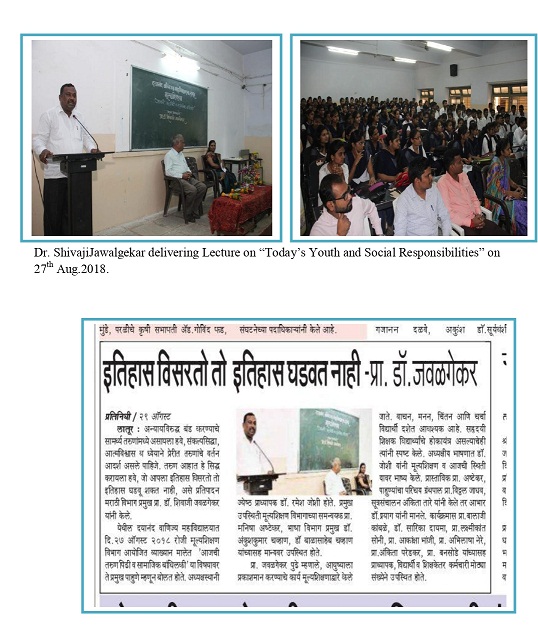
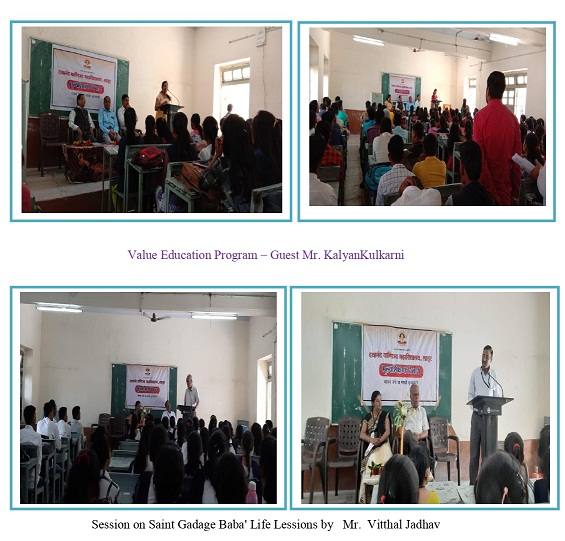
Value Education program-Guest Shri.Ravi Purnapatre:
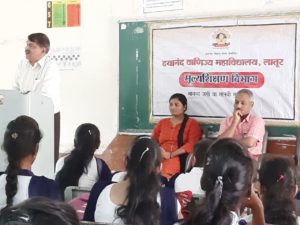
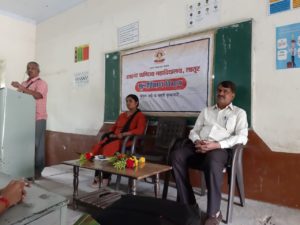
About the Cell:
The college takes initiatives to conduct a course on Gandhian values for sustainable peace (GVSP) and an exam based on it. The idea behind this is to encourage the students to reflect on their understanding of Gandhiji’s ideals. It is a course and an exam on Gandhi’s life, work, value and thoughts. It is an annual certificate programme to guide Students with the principles of non-violence. The college constituted a separate cell under the chairmanship of Miss. Ashtekar Manisha. The members of the cell are- Miss .Bhanji Akanksha, Miss.Ankita Parandekar. The reading material is made available in the form of books (class wise different books) by the Gandhi Research Foundation, Jalgaon. The exam is conducted on the specified date and result is communicated to the Gandhi Research Foundation. After verification of the result the Foundation provides certificates which are be distributed to the participant students. In this year 138 students and 5 Teachers enrolled from the college.
Objectives:
- To nurture the Students with principles of non-violence and peace
- To Promote the Philosophy of Gandhiji’s life, which is based on truth
- To inculcate the Gandhian thoughts within students.
Committee of GVSP:
DR.Manisha Ashtekar
Miss. Akanksha Bhanji
Miss. Ankita Parandekar
Activity Reports:
| Year | Web link |
| 2023-24 | Gandhi Vichar Sanskar -ATR |
| 2021-22 | Gandhi Vichar Sanskar Pariksha-ATR |
| 2018-19 | Gandhian Values For Sustainable peace |
| 2017-18 | Gandhian Values For Sustainable peace |
Future Plan:
- Enhancing the participation at college level
- Some eminent personalities will be invited for guest lecture
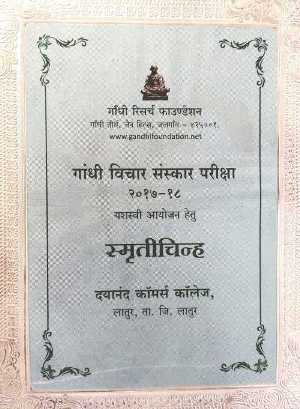
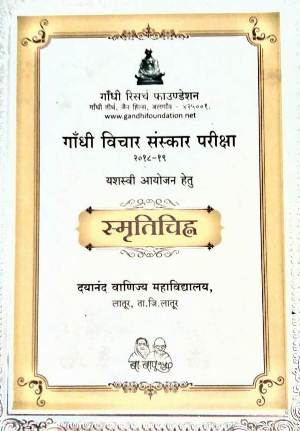
Tab Content
Tab Content
Tab Content
Distal Photo Mixing & Commercial Publishing
Latur is a district place which has recently celebrated its Silver Jubilee year. It has a population of 20,80,285 and a literary rate of 74.54% as per the 2001 census. The district is famous for its educational Latur Pattern. It has two industrial areas which includes Oil mills, nutcrackers, locks, stoves, brassware, milk powder, ginning and pressing and other industries.
Dayanand College of Commerce is a leading institution of education in commerce. It is the only independent college of commerce in the entire Marathwada region. Established in 1961, the college is a pioneer in its mission of developing young and dynamic entrepreneurs.
The college has excellent infrastructural facilities, specious classrooms, a recreation hall, a rich library and a big and beautiful campus. The computer centre of the college is one of the finest in the area. There are 175 latest computer systems with Internet facility.
The college conducts UG and PG courses leading to B.Com., B.C.A., B.B.A., and M.Com. The students’ Enrolment in this academic year 2010-11 is 1621 i.e. 1360 (UG), 261 (PG).
We are already running UGC vocational courses like Foreign Trade Practices & Procedure and Computer Application successfully. The college has the capability to introduce the career-oriented course under UGC scheme. There is tremendous demand for career-oriented courses in our region/ district. We can successfully run these courses.
Syllabus : Download
Retail Management
Retail is a major sector of Indian and Global economy. Our cource in retail manageis a certificate course in management. It aims at providing a comprensive view of retailing and detail analysis of retail environment. This certificate course focuse on retail management and marketing subjects, this program devels into shaping the retail industry. It is a unique blend of general management and retail management. This cource is for those students who wish to define retail space of tomorrow’s.
Outcomes:-
1) Students equip with business knowledge across retail and allied sectors.
2) Students identified and analysie business challenges.
3) Develop students with communication and skills, thereby enhancing managerial effectiveness.
